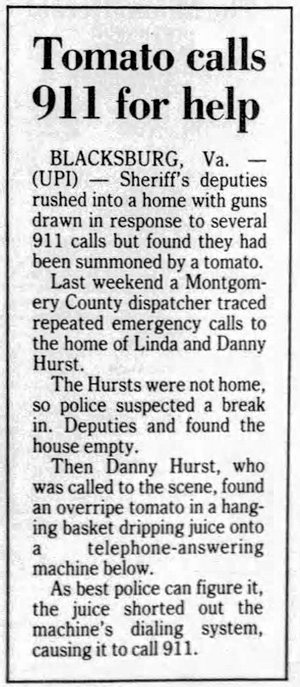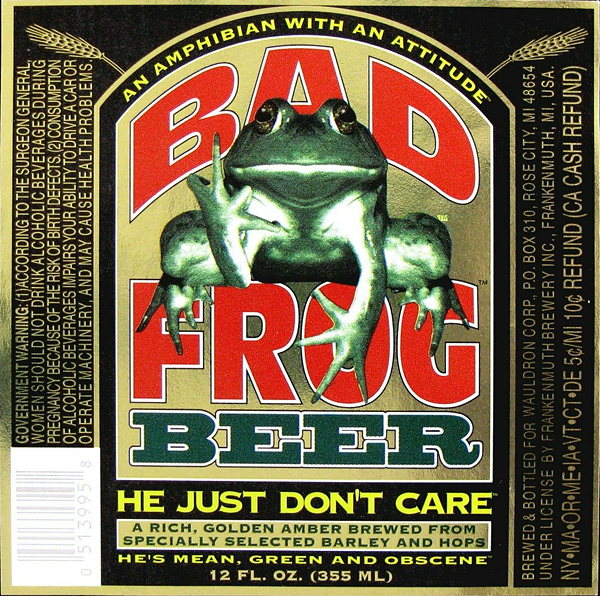1990s
Method of executing a tennis stroke
In 1999, Kevin and George Repper were granted a patent (No. 5,993,336) for a "method of executing a tennis stroke". The method consisted of hitting a tennis ball while kneeling on the right knee — that knee being protected by a kneepad.This raises two questions. First, how did they possibly obtain a patent for this? And second, why did they bother getting a patent for this? Did they seriously expect other tennis players to license this method from them?
I don't know the answer to the first question, but I have a hypothesis about the second. Some googling reveals that George Repper was a patent attorney while his son, Kevin, was on a high-school tennis team. So my guess is that the patent was some kind of father-son bonding experience, with the father showing his son how to obtain a patent. And it seems like the son is also now a patent attorney.

Posted By: Alex - Sun Dec 19, 2021 -
Comments (0)
Category: Inventions, Patents, Sports, 1990s
Tomato calls 911 for help
Adding this to the 'vegetables' category, despite the controversy over whether tomatoes are fruits or vegetables.
Miami Herald - Nov 10, 1990
Posted By: Alex - Wed Dec 15, 2021 -
Comments (2)
Category: Vegetables, 1990s
Henry Kissinger, Weatherman
Henry Kissinger fulfilling his dream of being a weatherman.Info: Orlando Sentinel, May 15 1991
Posted By: Alex - Wed Dec 01, 2021 -
Comments (5)
Category: Television, Diplomacy and Foreign Relations, 1990s, Weather
Amphibia Eau de Toilette
A fragrance for muppet fans was a cute idea, but the image of Kermit with six-pack abs was a bit unsettling.
For some reason, Amphibia was deemed culturally significant enough to be added to the Smithsonian's collection. From the Smithsonian:

Fort Myers News-Press - Dec 26, 1995
Posted By: Alex - Sat Oct 16, 2021 -
Comments (1)
Category: 1990s, Perfume and Cologne and Other Scents
Bad Frog Beer
Can you guess why Bad Frog Beer was banned in New York, Ohio, Pennsylvania, New Jersey, and North Carolina? The answer is below in extended.
More in extended >>
Posted By: Alex - Fri Oct 15, 2021 -
Comments (5)
Category: Corporate Mascots, Icons and Spokesbeings, 1990s, Alcohol
Robber warns of robbery
Jan 1995: Raymond Cuthbert warned an employee at Nolan's Pharmacy that he would be back in half an hour to rob the store. Sure enough, he returned a half hour later with a friend who was carrying a concealed weapon. The two were arrested by the waiting police.
The Vernon Morning Star - Jan 6, 1995
Perhaps Raymond had in mind the law proposed in Texas in 1973 that would have required criminals to give their victims advance notice before committing a crime.
Posted By: Alex - Fri Sep 24, 2021 -
Comments (0)
Category: Stupid Criminals, 1990s
The Alaskan Slot Machine
1990: Customers of a laundromat in Anchorage, Alaska frequently complained that the slot machine in the establishment never paid out any money, even if a winning combination came up, and one of them eventually called the police about it.The police initially agreed that it seemed like theft to never pay out winnings, so they confiscated the slot machine. But then the owner of the laundromat explained that the machine was deliberately fixed to not pay off, because gambling was illegal in Alaska. Furthermore, a small sign next to the machine said that it was "For Amusement Only". Perhaps, he conceded, the sign was not prominent enough, but it was there nevertheless.
Upon hearing this, the police decided the slot machine was legal and let the owner take it back.

Daily Sitka Sentinel - Jan 4, 1990

Tampa Bay Times - Mar 17, 1996
Posted By: Alex - Sat Sep 18, 2021 -
Comments (3)
Category: 1990s, Gambling, Casinos, Lotteries and Other Games of Chance
The Boeing Sky Commuter
Another car-plane hybrid that never made it into production.Article here.

Posted By: Paul - Fri Jul 02, 2021 -
Comments (1)
Category: Technology, Air Travel and Airlines, 1990s, Cars
Puppet Officer Brendan O’Smarty
1993: Under pressure from his superiors to stop carrying his ventriloquist dummy with him while on patrol, San Francisco Police Officer Bob Geary decided to take the matter to the voters. He formed the "Committee to Save Puppet Officer Brendan O'Smarty" and succeeded in putting the issue on the ballot.The voters decided by a narrow margin of 51% to 49% to allow him to continue patrolling with Brendan O'Smarty.
This turns out not to be the first puppet officer we've posted about. Just a few months ago, Paul posted about puppet officer Jerry McSafety. I wonder how many more puppet officers there are?
More info: wikipedia, alchetron

Geary with Puppet Officer Brendan O'Smarty
Posted By: Alex - Fri Jun 18, 2021 -
Comments (0)
Category: Police and Other Law Enforcement, Puppets and Automatons, 1990s
Odyssey: Into the Mind’s Eye
1990s production of psychedelic trip with soundtrack.
Posted By: Paul - Wed May 19, 2021 -
Comments (0)
Category: Drugs, Psychedelic, Music, Special Effects, 1990s

| Who We Are |
|---|
| Alex Boese Alex is the creator and curator of the Museum of Hoaxes. He's also the author of various weird, non-fiction, science-themed books such as Elephants on Acid and Psychedelic Apes. Paul Di Filippo Paul has been paid to put weird ideas into fictional form for over thirty years, in his career as a noted science fiction writer. He has recently begun blogging on many curious topics with three fellow writers at The Inferior 4+1. Contact Us |




